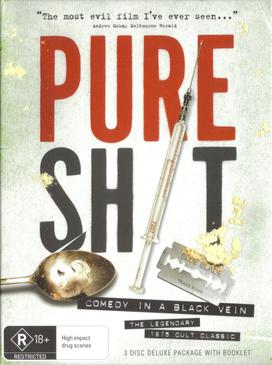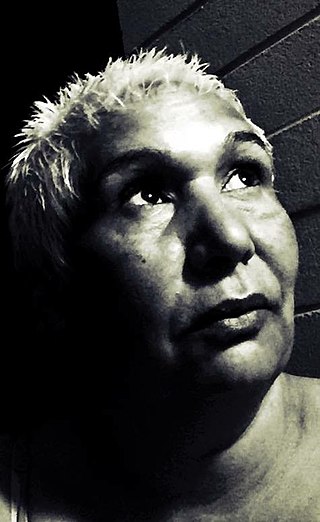Related Research Articles
Mark Little is an Australian actor, television presenter, comedian and screen/stage writer. He is known for portraying the role of Joe Mangel from 1988-1991, 2005 and 2022 on the Australian soap opera Neighbours.

James Oswald Little, AO was an Australian Aboriginal musician, actor and teacher, who was a member of the Yorta Yorta tribe and was raised on the Cummeragunja Reserve, New South Wales.
TAFE NSW is an Australian vocational education and training provider. Annually, the network trains over 500,000 students in campus, workplace, online, or distance education methods of education. It was established as an independent statutory body under the TAFE Commission Act 1990. The Minister for Regional Development, Skills and Small Business is responsible for TAFE NSW.
Wrong Side of the Road is a 1981 low-budget feature film made in South Australia. It is distinctive for being one of the first attempts to bring modern Australian Aboriginal music to a non-Indigenous audience, featuring all-Aboriginal rock reggae bands No Fixed Address and Us Mob.
Ken Quinnell is an Australia screenwriter and film director.

The National Film and Sound Archive of Australia (NFSA), known as ScreenSound Australia from 1999 to 2004, is Australia's audiovisual archive, responsible for developing, preserving, maintaining, promoting and providing access to a national collection of film, television, sound, radio, video games, new media, and related documents and artefacts. The collection ranges from works created in the late nineteenth century when the recorded sound and film industries were in their infancy, to those made in the present day.
The National Black Theatre (NBT) was a theatre company run by a small group of Aboriginal people based in the Sydney suburb of Redfern which operated from 1972 to 1977. The original concept for the theatre grew out of political struggles, especially the land rights demonstrations, which at the time were being organised by the Black Moratorium Committee. The centre held workshops in modern dancing, tribal dancing, writing for theatre, karate and photography, and provided a venue for new Aboriginal drama. It also ran drama classes under Brian Syron, whose students included Jack Davis, Freddie Reynolds, Maureen Watson, Lillian Crombie, and Hyllus Maris.
Brian Gregory Syron was an actor, teacher, Aboriginal rights activist, stage director and Australia's first Indigenous feature film director, who has also been recognised as the first First Nations feature film director. After studying in New York City under Stella Adler, he returned to Australia and was a co-founder of the Australian National Playwrights Conference, the Eora Centre, the National Black Playwrights Conference, and the Aboriginal National Theatre Trust. He worked on several television productions and was appointed head of the ABC's new Aboriginal unit in 1988.

Robert Lewis Maza, known as Bob Maza, was an Aboriginal Australian actor, playwright and activist.

Pure Shit is a 1975 Australian drama film directed by Bert Deling.

Cactus is a 1986 Australian drama film directed by Paul Cox and starring Isabelle Huppert.
The City's Edge is a 1983 Australian film co-written by Aboriginal Australian writer Bob Merritt.

Wayne Blair is an Australian writer, actor and director. He was on both sides of the camera in Redfern Now. He is also the director of the feature film The Sapphires.
The Cake Man is a 1975 play by Aboriginal Australian writer Bob Merritt, notable for being the first play written by an Indigenous Australian person to be published, televised and to tour out of Australia. A telemovie was made of a 1977 performance of the play. The Aboriginal Theatre Company was formed by Bob Merritt and Brian Syron especially to produce the play for a tour to the United States in 1982.

Trisha Morton-Thomas, also known as Patricia Morton-Thomas, is an Anmatyerr woman born in the Northern Territory of Australia. She is a writer, producer, director and actor who has worked in the Australian film industry since 1998 when she appeared in Radiance, the first feature film by director Rachel Perkins.
Sally Riley is an Australian filmmaker, writer, producer and media executive, as of 2021 Head of Scripted Production at the Australian Broadcasting Corporation (ABC).
Beck Cole is an Australian filmmaker of the Warramungu and Luritja nations. She is known for her work on numerous TV series, including First Australians, Grace Beside Me, Black Comedy and Wentworth, as well as documentaries and short films. She is based in Alice Springs, in the Northern Territory.
Robert James Merritt, known as Bob Merritt or Bobby Merritt and credited as Robert J. Merritt, was an Aboriginal Australian writer and activist. He is especially known for his play The Cake Man, and for founding the Eora Centre for the Visual and Performing Arts.
Danielle MacLean is an Australian filmmaker. She is known for her writing on television series such as Little J & Big Cuz, 8MMM Aboriginal Radio and Redfern Now.
Steven McGregor is an Australian filmmaker, known for his work on Redfern Now, Black Comedy, Sweet Country, and numerous documentaries, including My Brother Vinnie.
References
- ↑ Kathy Bail, "Short Changed", Australian Film 1978-1992, Oxford Uni Press, 1993 p204
- ↑ "Australian Films at the Australian Box Office", Film Victoria. Retrieved 24 October 2012
- 1 2 Mary Colbert, "Positive action: Bob Merritt, playwright and screenwriter", Cinema Papers, May 1985 p24
- 1 2 Kruger, Debbie. "Bob Merritt's message of understanding". The Weekend Australian . Retrieved 9 December 2021– via Debbie Kruger.
- 1 2 "Short Changed: About". Ozmovies. Retrieved 9 December 2021.
- ↑ "Short Changed (1985): Credits". Australian Screen Online. National Film & Sound Archive . Retrieved 9 December 2021.
- 1 2 3 Byrnes, Paul; Moreton, Romaine. "Short Changed (1985): Curator's notes, and Secondary curator's notes". Australian Screen Online. National Film & Sound Archive . Retrieved 9 December 2021.
- ↑ David Stratton, The Avocado Plantation: Boom and Bust in the Australian Film Industry, Pan MacMillan, 1990 p205-207